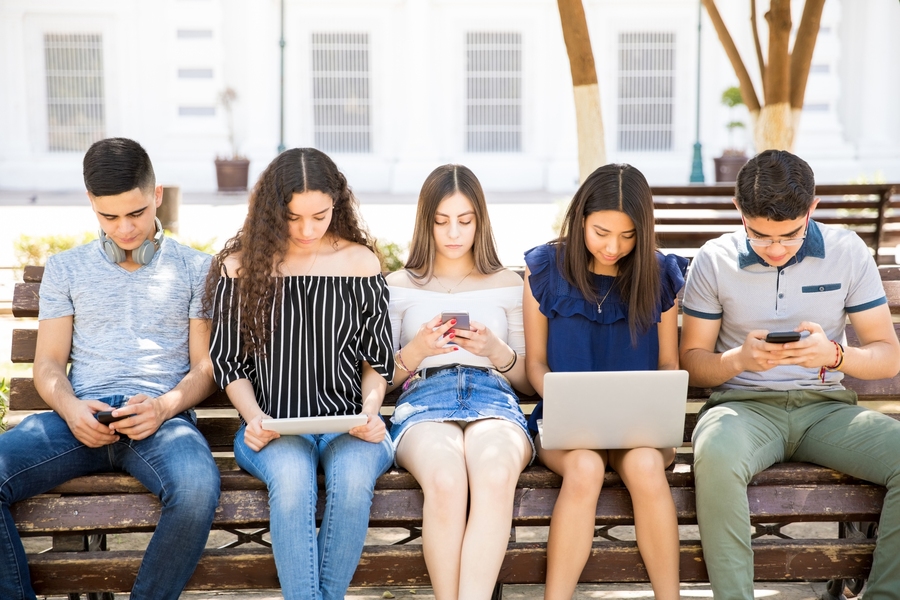In the age of connectivity, the influence of social media permeates every aspect of our lives, and for college-aged students, this impact is particularly profound. From shaping social interactions to influencing academic experiences, the role of social media is undeniable.

Darby Strong/THUNDERWORD
It is worth looking into the multi-faceted impact of social media on college students and exploring the nuances that it brings along with it. Social media platforms serve as virtual town squares, connecting college students in ways unimaginable a few decades ago.
The ability to forge connections with peers, share experiences, and build communities fosters a sense of belonging that can be both enriching and supportive.
The digital age has transformed the academic landscape. Social media facilitates instant information exchange, allowing students to access study materials, collaborate on projects, and engage in discussions beyond the confines of the classroom.
Platforms like Facebook Groups and online forums have become virtual classrooms, offering a space for shared learning experiences. But while social media provides a platform for connection, it also brings challenges, especially regarding mental health.
The constant exposure to curated images and lifestyles on platforms like Instagram and Snapchat can contribute to feelings of inadequacy, fostering a culture of comparison that may impact self-esteem and mental well-being.
Social media plays a pivotal role in career development for college students. Platforms like LinkedIn provide opportunities for networking with professionals, accessing job postings, and gaining insights into various industries.
A well-crafted online presence can enhance students’ visibility in the job market. The flip side of the social media coin is the potential for distraction and procrastination. The lure of notifications and the endless scroll can divert students’ attention from academic tasks.
Finding a balance between staying connected and focusing on studies is an ongoing challenge.
Social media platforms have become powerful tools for activism and social change. College-aged students, passionate about various causes, use these platforms to raise awareness, organize events, and mobilize support for societal issues.
The digital realm has become a catalyst for grassroots movements. To harness the positive aspects of social media while mitigating the challenges, college students can adopt mindful practices. Setting boundaries on usage, curating a positive online environment, and taking regular digital detoxes are strategies that promote a healthier relationship with social media.
The impact of social media on college-aged students is intricate, influencing both their personal and academic spheres. While it facilitates connections, learning, and activism, it also poses challenges to mental health and academic focus.
As students navigate this digital landscape, it’s crucial to strike a balance, leveraging the benefits while mitigating potential drawbacks. Ultimately, a mindful approach to social media can empower college-aged students to navigate the complexities of the digital age while fostering personal growth and success.
Social media has also come a long way for a lot of people that rely on content creation that supports their business when it comes to ad campaigns.
“I think that social media is definitely something that many find useful. It allows us to communicate and know some of the things that’s going on around the world,” said Melina Sepahram, a front desk assistant for the Benefit Hub here at Highline College. “One of the negatives of social media is that it sets many standards. And it could negatively impact students’ mental health.”
Sepahram continued to explain that social media can have a negative impact on a student’s personal life and academic life because it increases procrastination. Social media has became one of the most addictive things that people have become accustomed to because of the algorithms put in place by the people that create social media.
Limiting how much time is spent on social media is crucial, especially if you have a lot on your plate and you are trying to balance your life that’s full of all types of challenges including your school and work schedule. It is challenging, but it’s good to maintain a well balanced life that can benefit your mental health without having stress.
Another example of social media and how it affects college students is when students show up to college to advance their skills and knowledge, teachers are expecting students to have full focus on what’s being taught in class without being interrupted, but social media often gets in the way of this goal.
Social media is in the business of entertainment and they have grown tremendously. Most students are at times distracted by the content they are seeing on social media and it’s somewhat challenging not to look at social media during class time, especially when there is something funny to look at.
Another impact social media has on college students is its potential to contribute to feelings of loneliness and depression when they can’t be part of the activities because of the excessive time spent on social media, which can lead to unfavorable comparison, feeling of inadequacy, and a sense of missing out.
All in all, it’s on students of all ages to monitor their own social media usage and utilize the tools available to get the most out of their phones and other electronics. The challenge of this generation is to take a wealth of possibilities available and use them wisely.

